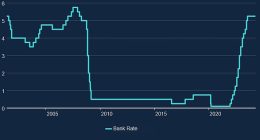
Opinions expressed by Entrepreneur contributors are their own.
You’re reading Entrepreneur Asia Pacific, an international franchise of Entrepreneur Media.
Let’s face it: the global economy is a mess and crises are luring around every corner. Banks collapse, companies go out of business, and even entire markets fail. Amidst this growing entropy, people are seeking ways to invest their money safely and guarantee returns.
Aleksandr Voronkov (aka Aleksandr Genadinik), an investor who’s managed to come out of the pandemic and recent economic crises with a steep rise in profits, shares a piece of wisdom with readers. He hails real estate as the ultimate investment asset that can withstand market fluctuations.
Shaky Investment Landscape
When people consider investing, many assets come to mind. And investors have heard advice on diversifying so many times it becomes a natural step to try it. Today, however, it might not be the best idea. “Take the stock market, for example. The pandemic shook the entire realm of stock trading to the core, and the ongoing military conflicts around the world are aggravating the issue,” explains Alexandr.
He also underlines the role of governments and large corporations in deepening the instability of global markets. They use stocks, bonds, and precious metals as tools to exercise economic impact, selling and buying them in bulk to speculate prices and compete with other enterprises or even entire national economies. Inner political struggles also influence investment climates. The recent clashes between Republicans and Democrats in the US have had a detrimental effect not only on the economy but on society as a whole. As a result, says Voronkov, major investment assets become extremely shaky in value, and the entire system loses the last bit of transparency and predictability.
When it comes to newer, alternative assets, things are not in any way more stable. Cryptocurrencies, for instance, have experienced wild fluctuations in value. Bitcoin, the most prominent cryptocurrency, reached unprecedented highs and then suffered a dramatic decline, leaving many investors with losses. Similarly, the market for NFTs has witnessed extraordinary growth and media attention. However, concerns regarding the long-term value and sustainability of these assets keep rising. While some NFTs have sold for astronomical sums, there is a lingering question about whether these valuations are sustainable or just reflect a speculative frenzy.
Real Power of Real Estate
Is there a silver lining to this chaotic economic climate? Perhaps we can’t see it yet. What we do have, Alexandr believes, is a safe haven investors can turn to for more stability. And this haven is real estate. Unlike the vulnerability observed in other asset classes, real estate offers a tangible and enduring value.
“Yes, experienced (and often very lucky) investors can raise impressive sums speculating on volatile assets. But if you really want to keep and multiply your wealth, real estate is the way to go. The factual and symbolic stability of real estate is actually reflected in its physical nature,” explains Aleksandr.
A smart approach to real estate investment strategies can further minimize the risks of financial downturns. Savvy investors can identify undervalued properties, make strategic acquisitions, and profit from appreciation over time. The flexibility of real estate investments enables investors to adapt to changing market conditions and capitalize on emerging trends.
One of the key (and obvious) advantages of real estate is its ability to generate consistent passive income through rental payments. On top of that, rental income typically increases over time as rental rates gradually rise in line with inflation and market trends. Buy-and-hold is also a great value-generating strategy. Unlike other investments that require constant attention and management, real estate allows for a more relaxed approach. This strategy emphasizes long-term investment rather than trying to time market fluctuations.
Aleksandr emphasizes that he doesn’t want to completely defer investors from working with other assets. In some cases, real estate can be a proverbial safety net for an investor’s portfolio. “By allocating a portion of your portfolio to real estate, you will be able to hedge against the risks associated with other asset classes.”
Go Abroad to Go Big
At this point, the perks of investing in real estate are crystal clear. But how do you do it right? Aleksandr suggests people explore the international real estate market – some countries are more attractive than others when it comes to the choice, quality, and prices of properties for investors.
“Think of the US real estate market. For outside investors, this is a less accessible market than other options such as Asian markets. Besides, the rising key interest rate has a huge influence on the investment climate in the USA. Particularly, mortgages get more expensive, which leads to the entire market stagnation. This is not very good news for investors. Such countries as Indonesia, on the other hand, are very investment-friendly. It’s easier to enter the market and properties are more affordable,” says Voronkov.
Aleksandr knows what he’s talking about. He founded PT Darshan Group Indonesia – a company specializing in constructing upscale villas and other high-end properties, in addition to engaging in real estate investment. The company is now leading the construction of more than 20 objects on the island, encompassing 1 hectare of territory.
Of course, Indonesia is not the only choice for international real estate investors. Other countries with a great investment climate are UAE, Singapore, Thailand, and Portugal, to name a few. It’s up to you as an investor to choose the most suitable location. Factors to consider may include economic growth, legal and regulatory frameworks, taxation policies, and potential returns on investment. Conducting thorough research, seeking expert advice, and assessing your investment goals and risk tolerance will help you make an informed decision.
Sharing is Caring (for Investors, Too)
One thing that prevents many people from investing in real estate is the high entry cost, especially in expensive markets like the US. In places like New York, a $500,000 investment in a rental property may yield $5,000-7,000 monthly. However, monthly service fees, which can reach $2,000-3,000, real estate agent commissions, and additional expenses significantly erode profits, making the investment less attractive.
Emerging markets like Indonesia, however, offer great villas at $200,000-300,000, with solid year-round rental profits and fewer fees, making it more accessible for investors. But for those who are eager to become real estate investors but don’t have enough capital to make their first property purchase, Aleksandr suggests shared or fractional investment options.
Shared investments enable pooling resources with friends or partners to collectively buy property, sharing costs and responsibilities like down payments, maintenance, and property management. Another option is fractional investment platforms, where investors buy a portion of a property with others, allowing them to benefit from real estate returns without shouldering the full financial burden. These options, including crowdfunding platforms, real estate investment trusts (REITs), and joint ventures, provide pathways into real estate without requiring substantial initial capital.
Bottom line: Investing in real estate is a way to secure profits and withstand economic volatility. Buy properties, speculate, rent out – the choice is yours. Real estate offers a versatile and reliable path to financial success in an ever-changing market.
This article is from Entrepreneur.com









